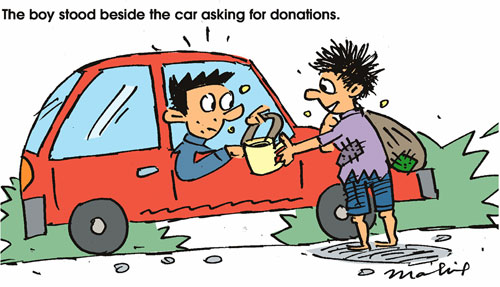|

by R. S. Karunaratne
Simple past tense
We use the simple past tense for an action that occurred in the past.
Sometimes, we use adverbs or time phrases to indicate the past.
A long time ago kings ruled the island.
In those days people had no means of modern transport.
I met Jim last night.

She was at one time the prime minister of Sri Lanka.
The principal came just now.
Once upon a time powerful kings ruled the Anuradhapura kingdom.
Those who came earlier bought all the tickets.
She came later than others.
Yesterday was a public holiday.
We use the simple past tense to refer to an action which took place
over a period of time in the past.
When I was a student I walked two kilometres daily.
As an undergraduate Thelma shared a room with three others.
During the 1950s my father drove to work daily in his old car.
During his early years at school, Ranjith often got into trouble with
his teachers.
Fred and I frequently studied together when we were at the Law College.
Newspapers use the simple past tense when reporting certain past
events.
Last week robbers broke into a house at Katubedda.
The wild fire spread swiftly to more crowded areas.
Tsunami destroyed a row of houses.
During the economic recession thousands of people lost their jobs.
The judge warned the defence lawyer not to waste the court's time.
[Activity ]
Underline the correct verbs in the following sentences and check your
answers with the key.
1. In those days, men prefer / preferred to walk.
2. For many weeks, workers hope / hoped that the company would settle
their strike.
3. When we were children, we were taught / teach how to behave in
society.
4. Sam dislikes / disliked practising the law after taking his oaths as
a lawyer.
5. Anuradhapura occupies / occupied an important position in ancient Sri
Lanka.
6. Climbing Sri Pada usually takes / took two days but we did it in a
day.
7. During the World War I people find / found it very difficult to get
jobs.
8. Grandfather almost fell / was falling over a chair when he was
rushing out of the house.
9. Champa's friends were teasing / tease her daily about her hairstyle.
10. Nelum always find / found it difficult to travel from Kandy to
Colombo.
Key: 1. preferred 2. hoped 3. taught 4. disliked 5. occupied 6. takes
7. found 8. fell 9. teasing 10. found
Quiz on idioms
Idioms are one of the most interesting parts of the English language,
especially when you are learning it. Here's a quiz.
We give you the first part of the idiom in column 'A'. Complete the
idiom and check your answers with the key.
[Column A]
1. Early to bed and early to rise ...
2. The darkest hour is ...
3. Charity begins ...
4. Behind every great man ...
5. He who laughs last ...
6. Honesty is ...
7. Laughter is ...
8. May the best ...
9. Put your ...
10. Discretion is ...
11. Half a loaf ...
12. Prevention is ...
13. Better late ...
14. Better safe ...
15. Better the devil you know ...
16. Between the devil ...
17. Read between ...
18. Beyond a shadow ...
19. Beyond your ...
20. A big fish ...
21. A clean bill ...
22. The early bird ...
23. Kill two birds ...
24. Birds of a feather ...
25. Bite off ...
26. Bite the hand ...
27. Once bitten ...
28. The pot calling ...
29. A bad workman ...
30. Turn a ...
Key:
1. Early to bed and early to rise makes a man healthy, wealthy and
wise.
2. The darkest hour is just before the dawn.
3. Charity begins at home.
4. Behind every great man there stands a woman.
5. He who laughs last laughs longest.
6. Honesty is the best policy.
7. Laughter is the best medicine.
8. May the best man win.
9. Put your best foot forward.
10. Discretion is the better part of valour.
11. Half a loaf is better than none.
12. Prevention is better than cure.
13. Better late than never.
14. Better safe than sorry.
15. Better the devil you know than the devil you don't.
16. Between the devil and the deep blue sea.
17. Read between the lines.
18. Beyond a shadow of a doubt.
19. Beyond your wildest dreams.
20. A big fish in a small pond.
21. A clean bill of health.
22. The early bird catches the worm.
23. Kill two birds with one stone.
24. Birds of a feather flock together.
25. Bite off more than you can chew.
26. Bite the hand that feeds you.
27. Once bitten twice shy.
28. The pot calling the kettle black.
29. A bad workman blames his tools.
30. Turn a blind eye.
Starters:
Use of prepositions
[Part 3]

Prepositions in English are important because most sentences we make
have at least one preposition. Be familiar with the following
prepositions.
[Beside / besides ]
If somebody or something is beside somebody or something else, they
are at their side or next to them.
The stranger sat down beside Mary.
The boy stood beside the car asking for donations.
The principal gestured towards the teacher beside him.
If you fight beside somebody, you fight together in cooperation with
each other.
The Indian army agreed to fight beside the local army against
terrorists.
If you have something besides other things, you have it in addition to
those things.
Besides her interest in music, she had a flair for languages.
[Between]
If something is between two things, these two things are on either
side of it.
I always have a pain between my shoulders.
Rex sat between Renuka and Gemini.
If you move between two places, you move from one place to the other.
For 30 years I was commuting between Panadura and Colombo.
If somebody stands between you and another person, you will not be able
to have a good relationship with that person.
Middlemen intervene between farmers and consumers.
If something happens between two times, it happens after one and before
the other.
The island was ruled by foreigners between the 16th and 20th centuries.
We use between to indicate a range of ages.

Only students between the ages of 10 and 15 can participate in the
competition.
If somebody or something is between one thing and another, it is a
mixture of them.
He was something between a teacher and a philosopher.
The following nouns are usually followed by between: agreement,
alliance, balance, bond, collision, connection, contact, coordination,
correspondence, encounter, feud, friendship, interplay, link, merger,
misunderstanding, partnership, rapport, split, understanding.
If you choose between two things, you choose only one of them.
Your choice is now between English and Sinhala.
When you share something between two people, they both use it.
We allowed the kitchen to be shared between two families.
[But ]
As a preposition but means 'except.'
Reynold was anything but nice.
[Concerning ]
We use concerning to show that we are taking a certain fact into
account.
Concerning the situation, we had to accept the offer.
Making verbs from nouns
A good knowledge of word families will help you to enrich your
vocabulary. In the following quiz you have to fill in column 'B' with
the relevant verbs for the nouns given in column 'A'.
Check your answers with the key.
[Column A] [Column B]
1. Necessity .................
2. Normality .................
3. Obedience .................
4. Offence .................
5. Office .................
6. Operation .................
7. Opposition .................
8. Option .................
9. Organization .................
10. Origin .................
11. Ownership .................
12. Publication .................
13. Punishment .................
14. Purification .................
15. Qualification .................
16. Reaction .................
17. Readiness .................
18. Realization .................
19. Receipt .................
20. Recognition .................
21. Reference .................
22. Reflection .................
23. Regularity .................
24. Relation .................
25. Relaxation .................
26. Reliability .................
27.Representation .................
28. Response .................
29. Retirement .................
30. Richness .................
Key:
1. necessitate
2. normalize
3. obey
4. offend
5. officiate
6. operate
7. oppose
8. opt
9. organize
10. originate
11. own
12. publish
13. punish
14. purify
15. qualify
16. react
17. ready
18. realize
19. receive
20. recognize
21. refer
22. reflect
23. regulate
24. relate
25. relax
26. rely
27. represent
28. respond
29. retire
30. enrich |



